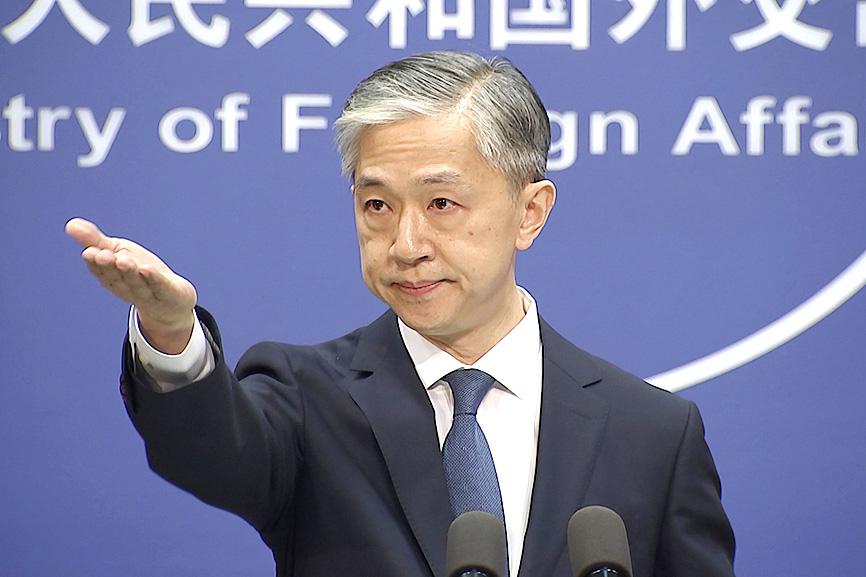The US yesterday ordered China to close its consulate in Houston, Texas, and accused it of increasing its spying operations, dramatically escalating diplomatic tensions between the feuding nations.
The announcement infuriated Beijing, which vowed to retaliate as the two nations squabble over a slew of issues ranging from trade to the COVID-19 pandemic — as well as China’s policies in Hong Kong, Xinjiang and the South China Sea.
“We have directed the closure of PRC [People’s Republic of China] Consulate General Houston in order to protect American intellectual property and Americans’ private information,” US Department of State spokeswoman Morgan Ortagus told reporters during a visit by US Secretary of State Mike Pompeo to Denmark.

Photo: AP
She added that under the Vienna Convention, states “have a duty not to interfere in the internal affairs” of the receiving state, but there were no further details about the reasons behind the decision.
In another statement, the department said that China has engaged in massive spying and influence operations throughout the US for years.
“These activities have increased markedly in scale and scope over the past few years,” it said.
Before the news emerged, firefighters and police on Tuesday were called to the consulate after reports that documents were being burned in trashcans in the courtyard.
The Houston Police Force Twitter feed said that smoke was observed, but officers “were not granted access to enter the building.”
In Beijing, Chinese Ministry of Foreign Affairs spokesman Wang Wenbin (汪文斌) said that China was told that the consulate would have to close, calling it an “outrageous and unjustified move which will sabotage China-US relations.”
“China urges the US to immediately withdraw its wrong decision, or China will definitely take a proper and necessary response,” Wang said at a news conference. “It is a political provocation unilaterally launched by the US side, which seriously violates international law ... and the bilateral consular agreement between China and the US.”
The consulate in Houston was opened in 1979 and it covers eight southern US states, including Texas and Florida. There are five Chinese consulates in the US, as well as an embassy in Washington.
China’s state-run Global Times launched a poll on Twitter in English asking people to vote for which US consulate in China should be closed in response, including the ones in Hong Kong, Guangzhou and Chengdu.
The US has an embassy in Beijing and five consulates in China, as well as one in Hong Kong.

ROLLER-COASTER RIDE: More than five earthquakes ranging from magnitude 4.4 to 5.5 on the Richter scale shook eastern Taiwan in rapid succession yesterday afternoon Back-to-back weather fronts are forecast to hit Taiwan this week, resulting in rain across the nation in the coming days, the Central Weather Administration said yesterday, as it also warned residents in mountainous regions to be wary of landslides and rockfalls. As the first front approached, sporadic rainfall began in central and northern parts of Taiwan yesterday, the agency said, adding that rain is forecast to intensify in those regions today, while brief showers would also affect other parts of the nation. A second weather system is forecast to arrive on Thursday, bringing additional rain to the whole nation until Sunday, it

LANDSLIDES POSSIBLE: The agency advised the public to avoid visiting mountainous regions due to more expected aftershocks and rainfall from a series of weather fronts A series of earthquakes over the past few days were likely aftershocks of the April 3 earthquake in Hualien County, with further aftershocks to be expected for up to a year, the Central Weather Administration (CWA) said yesterday. Based on the nation’s experience after the quake on Sept. 21, 1999, more aftershocks are possible over the next six months to a year, the agency said. A total of 103 earthquakes of magnitude 4 on the local magnitude scale or higher hit Hualien County from 5:08pm on Monday to 10:27am yesterday, with 27 of them exceeding magnitude 5. They included two, of magnitude

CONDITIONAL: The PRC imposes secret requirements that the funding it provides cannot be spent in states with diplomatic relations with Taiwan, Emma Reilly said China has been bribing UN officials to obtain “special benefits” and to block funding from countries that have diplomatic ties with Taiwan, a former UN employee told the British House of Commons on Tuesday. At a House of Commons Foreign Affairs Committee hearing into “international relations within the multilateral system,” former Office of the UN High Commissioner for Human Rights (OHCHR) employee Emma Reilly said in a written statement that “Beijing paid bribes to the two successive Presidents of the [UN] General Assembly” during the two-year negotiation of the Sustainable Development Goals. Another way China exercises influence within the UN Secretariat is

Taiwan’s first drag queen to compete on the internationally acclaimed RuPaul’s Drag Race, Nymphia Wind (妮妃雅), was on Friday crowned the “Next Drag Superstar.” Dressed in a sparkling banana dress, Nymphia Wind swept onto the stage for the final, and stole the show. “Taiwan this is for you,” she said right after show host RuPaul announced her as the winner. “To those who feel like they don’t belong, just remember to live fearlessly and to live their truth,” she said on stage. One of the frontrunners for the past 15 episodes, the 28-year-old breezed through to the final after weeks of showcasing her unique